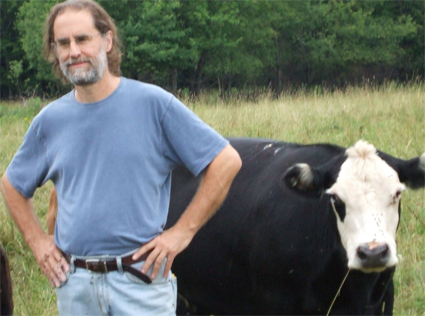Dr. Ken Jaffe, Slope Farms

Pure CatskillsBusiness Award Recipient, 2013
Award Purpose: To publicly recognize strong business leaders for their achievements in natural resource, regionally based businesses.
At Slope Farms, Ken raises and markets grass-fed beef. Over the last 10 years, his herd has grown to 160 head on 200 acres in Meredith, including 100 leased acres. He also markets beef for 15 other regional grass-fed beef producers. Their customers are mostly wholesale buyers — restaurants, butcher shops, Park Slope Food Coop, and retail stores — in NYC, Hudson Valley and locally. Slope Farms meat is also served at Diner Restaurant (Brooklyn), Beaverkill Valley Inn (Lew Beach), Autumn Café (Oneonta) and The Peekamoose Restaurant (Big Indian).
Formerly a general practice physician, Ken turned to farming and now runs the farm with his wife Linda; they have two adult sons, Lonne and Jake. Ken’s approach to land conservation is to manage the soil, grass and cattle as a self-sustaining ecosystem. With rotational grazing, the cattle build the soil, and the grass becomes progressively more productive and nutritious. Slope Farms doesn’t use chemicals on its fields, or antibiotics or hormones in its livestock, because they are not needed. In turn, Slope Farms’ stocking density increases. “I originally became interested in grass-fed beef production from looking at the relationship between how we raise livestock and human health,” says Ken. “This lead me to understand that grass-based production brings together several important goals: good eating, human health, regional economic development, farmland preservation, all with a small environmental footprint. With our farm situated on historic Turnpike Road, built in 1803 to bring agricultural products downstate, it was an easy step to understanding the major market being downstate is nothing new.”
According to Ken, grass-based production has the potential of replacing feedlots with their many problems including abuse of antibiotics, poor animal welfare, water and air pollution, chemical inputs to feed production, and waste of some of the nation’s best croplands to feed animals. But replacing feedlots will require not only getting more grassland under production, but also developing a new model of aggregating beef from smaller producers to wholesale buyers. “The new model requires creating a value chain for producers, while and maintaining quality and inventory flow,” adds Ken. “Working on this new model has brought me to partner with other producers to market their grass-fed beef and help scale up their production.”
Ken is a long-standing Pure Catskills member and has spoken on panels at the Farm to Market Connection and New York City food conferences. He writes a blog at www.slopefarms.com to actively raise awareness of naturally raised beef and its health benefits. He also is a member of the Town of Meredith’s Farmland Protection Plan Working Group. With funds from NYS Agriculture & Markets, the group produced the first town-based agricultural land protection plan in Delaware County.
“My initial response upon hearing about the award was to feel equal parts embarrassed and flattered. But I see this award to mean that the Watershed Agricultural Council recognizes that grass-fed beef is a model for regional farming that is profitable, environmentally sound, and scalable. And recognition means a lot to me. Market demand and the region’s superior grassland resources provide tremendous potential for growth of the grass-fed beef industry.”
